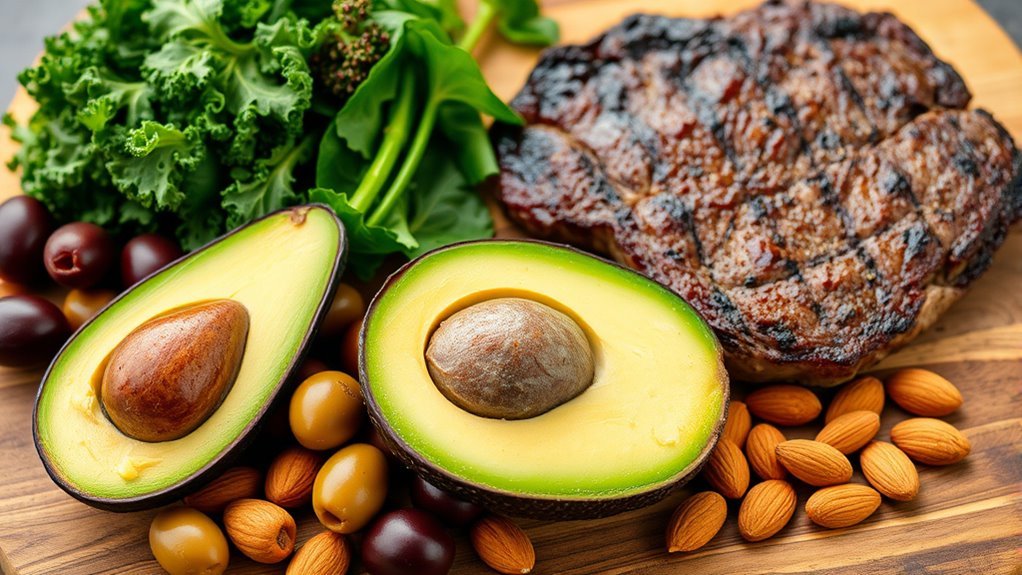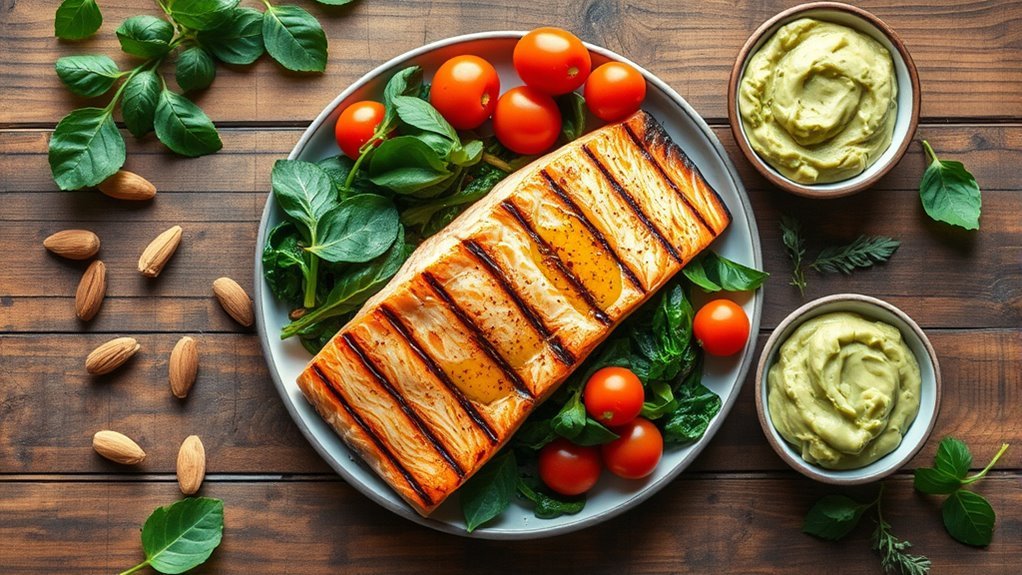The keto diet consists of a high-fat, low-carbohydrate approach that shifts your body into ketosis, encouraging it to burn fat for energy instead of carbs. Typically, it comprises 70-75% fats, 20-25% proteins, and 5-10% carbohydrates. You’ll include healthy fats like avocado and olive oil, along with low-carb vegetables such as spinach and zucchini. Avoid high-carb foods like bread and sugar to maintain ketosis. There’s much more to explore about meal planning and common challenges on this journey.
Understanding Ketosis

When you begin a keto diet, understanding ketosis is essential to achieving your health goals. The ketosis process involves shifting your body’s primary fuel source from carbohydrates to fat. This metabolic state not only aids in weight loss but also offers numerous ketosis benefits, such as improved energy levels and mental clarity. When your body breaks down fat, it produces ketones, which serve as an efficient energy source. Embracing this state allows you to experience sustained energy without the crashes associated with carbohydrate consumption. As you adapt to ketosis, you may find greater freedom in your food choices and energy management. Ultimately, grasping how ketosis works empowers you to make informed decisions on your journey toward peak health.
Macronutrient Breakdown

How can understanding the macronutrient breakdown enhance your success on a keto diet? By grasping the macronutrient ratios, you can effectively tailor your meals to achieve and maintain ketosis. The typical keto diet comprises approximately 70-75% fats, 20-25% protein, and 5-10% carbohydrates. These ratios are essential for keto calculations, helping you decide what to eat without feeling restricted. When you prioritize healthy fats and minimize carbs, you empower your body to utilize fat as its primary fuel source, promoting weight loss and improved energy levels. Embracing this nutritional freedom requires attention to detail, yet it allows for a satisfying and varied diet that aligns with your health goals. Understanding these ratios is key to revealing your keto journey.
Foods to Include in a Keto Diet

When following a keto diet, it’s essential to incorporate healthy fats and low-carb vegetables into your meals. These foods not only align with the macronutrient goals of the diet but also provide essential nutrients your body needs. Understanding which options to include can help you maintain ketosis and support overall health.
Healthy Fats Sources
Incorporating healthy fat sources into your keto diet is essential for achieving and maintaining ketosis, as these fats provide the energy your body needs while minimizing carbohydrate intake. Avocado benefits include being rich in monounsaturated fats, which support heart health. Coconut oil and olive oil are excellent for cooking, offering medium-chain triglycerides for quick energy. Don’t forget nut butters, which are not only delicious but also nutritious. Fatty fish like salmon provides omega-3 fatty acids, while various cheese varieties add flavor and calcium. Explore seeds options like chia and flax for added fiber and nutrients. Grass-fed butter and full-fat dairy products contribute to satiety, and a little dark chocolate can satisfy your sweet tooth while keeping you in ketosis.
Low-Carb Vegetables Options
While many vegetables are high in carbohydrates, there are plenty of low-carb options that can enhance your keto diet without compromising your carb limit. Focus on keto friendly greens like spinach, kale, and arugula, which are packed with nutrient density and fiber. Incorporating these fiber rich veggies can optimize digestion while keeping your meal prep simple. Seasonal vegetables, such as zucchini and bell peppers, also offer low carb options that can be used in various low carb recipes. Be mindful of vegetable carb counts to guarantee you stay within your limits. By embracing these choices, you’ll find that maintaining a keto lifestyle can be both satisfying and liberating. Enjoy the freedom of diverse flavors while staying on track!
Foods to Avoid on a Keto Diet
To successfully adhere to a keto diet, it’s essential to identify and eliminate certain foods that can hinder your progress. Avoid high-carb foods like bread, pasta, and sugar-laden snacks, as they can disrupt ketosis. Processed foods and sugary beverages should also be on your exclusion list, since they often contain hidden carbs. Instead, focus on incorporating low-carb options into your meal prep. When searching for keto snacks, opt for nuts, seeds, cheese, and low-carb vegetables to satisfy cravings without sabotaging your goals. Remember, freedom on a keto diet comes from making informed choices about what you eat, allowing you to enjoy a variety of flavors while staying aligned with your health objectives.
Health Benefits of the Keto Diet
The keto diet offers several health benefits that can greatly enhance your well-being. Research indicates it supports weight loss by promoting fat burning and can help regulate blood sugar levels, making it beneficial for those with insulin sensitivity. Additionally, many individuals report improved mental clarity and focus while adhering to a ketogenic lifestyle.
Weight Loss Support
Studies have shown that following a ketogenic diet can lead to significant weight loss for many individuals. By drastically reducing carbohydrate intake and increasing healthy fats, your body enters ketosis, where it burns fat for fuel. This shift not only supports weight loss but also enhances satiety, making it easier to manage cravings. Implementing effective keto meal prep can streamline your journey, ensuring you always have nutritious, compliant meals on hand. Combining this with other weight loss strategies, like regular exercise and mindful eating, can amplify your results. Embracing the keto diet offers a sense of freedom in food choices while promoting sustainable weight loss, allowing you to achieve and maintain your health goals without feeling deprived.
Blood Sugar Control
One of the notable benefits of a ketogenic diet is its potential to help regulate blood sugar levels. By considerably reducing carbohydrate intake, you lower glucose metabolism, which can stabilize your blood sugar. This dietary shift enhances insulin sensitivity, meaning your body utilizes insulin more effectively to manage glucose levels. Research indicates that individuals on a keto diet often experience fewer blood sugar spikes and crashes, promoting more consistent energy throughout the day. This stability can be particularly beneficial for those with insulin resistance or type 2 diabetes, allowing greater freedom in food choices without the constant worry of fluctuating blood sugar. Embracing a ketogenic lifestyle may lead to improved overall metabolic health and a more balanced approach to nutrition.
Enhanced Mental Clarity
When you adopt a ketogenic diet, you might notice a significant boost in mental clarity and cognitive function. This diet encourages your body to utilize ketones, which can enhance brain function and improve mental performance. Many people report clarity improvement and focus enhancement, leading to a productivity boost in daily tasks. Enhanced energy levels from fat metabolism can also contribute to sustained mental sharpness throughout the day. Additionally, the keto diet aids in mood stabilization, which can further support cognitive benefits. As you experience these changes, you may find yourself more capable of tackling challenges, allowing for greater freedom in your pursuits. Embracing the ketogenic lifestyle may ultimately lead to a sharper, more focused mind.
Potential Challenges and Side Effects
Although the keto diet can offer significant benefits for weight loss and metabolic health, it also presents potential challenges and side effects that you should be aware of. Common issues include the “keto flu,” which may cause fatigue and headaches, and digestive issues like constipation. Nutrient deficiencies can arise due to limited food choices, while electrolyte imbalance can lead to muscle cramps and fatigue. Cravings management becomes vital, especially during social challenges where food options may be restricted. Effective meal prep and adherence strategies can help combat these hurdles.
| Challenge | Description |
|---|---|
| Keto Flu | Symptoms like fatigue and headaches |
| Digestive Issues | Constipation and stomach discomfort |
| Nutrient Deficiencies | Lack of essential vitamins and minerals |
| Electrolyte Imbalance | Cramps and fatigue from low electrolytes |
Meal Planning for Keto
When planning your keto meals, it’s vital to focus on essential ingredients that support your low-carb lifestyle. Incorporating a variety of healthy fats, proteins, and low-carb vegetables will help you stay on track. You’ll also find that having a weekly meal plan can simplify grocery shopping and make meal prep more efficient.
Essential Keto Ingredients
To successfully navigate the keto diet, it’s crucial to stock your kitchen with the right ingredients that align with your low-carb, high-fat lifestyle. Focus on keto pantry staples and essential cooking oils to create delicious meals without compromising your goals.
| Keto Pantry Staples | Essential Cooking Oils | High-Fat Proteins |
|---|---|---|
| Almond flour | Olive oil | Salmon |
| Coconut flour | Avocado oil | Grass-fed beef |
| Chia seeds | MCT oil | Eggs |
These ingredients not only enhance flavor but also provide the necessary nutrients for energy and health. By incorporating these essentials, you’ll feel empowered and free to create satisfying meals that adhere to your keto lifestyle.
Weekly Meal Ideas
Building a successful keto meal plan involves more than just stocking up on the right pantry staples; it requires thoughtful organization and creativity in the kitchen. Start your week with keto breakfast ideas like scrambled eggs with spinach or a chia seed pudding topped with nuts. For lunch, consider grilled chicken salads with avocado and olive oil dressing. Dinner could feature zucchini noodles with pesto and shrimp. Don’t forget about keto snack options; keep cheese sticks, nuts, or celery with cream cheese handy for those in-between moments. Planning meals ahead not only saves time but also guarantees you stay on track with your keto goals, allowing you the freedom to enjoy delicious, satisfying foods without compromising your nutritional needs.
Common Mistakes to Avoid
While starting a keto diet can lead to impressive weight loss and health benefits, many individuals unknowingly fall into common pitfalls that can hinder their progress. One major mistake is clinging to keto misconceptions, such as thinking all fats are equal. Prioritizing healthy fats like avocados and olive oil is essential for diet adherence. Additionally, neglecting to track your macronutrients can lead to unintentional carb overconsumption, stalling your progress. Remember, not all low-carb foods are keto-friendly. Finally, be cautious of processed keto snacks that may contain hidden sugars and additives. By avoiding these mistakes and focusing on whole foods, you can harness the true power of the keto diet, allowing you to achieve your health goals with confidence.
Supplements and Keto
As you begin your keto journey, incorporating the right supplements can enhance your experience and support your nutritional needs. While the ketogenic diet focuses on high fats and low carbohydrates, it may limit your intake of essential nutrients. Keto supplements, such as magnesium, potassium, and electrolytes, can help maintain balance and prevent deficiencies that often arise during this shift. Additionally, omega-3 fatty acids and vitamin D can support overall health and inflammation reduction. By integrating these supplements, you’re not only ensuring you meet your nutritional requirements but also empowering yourself to embrace the freedom that comes with a well-rounded diet. Always consult with a healthcare provider to tailor your supplement regimen to your individual needs, ensuring the best results on your keto path.
Long-term Sustainability of the Keto Diet
To guarantee long-term sustainability of the keto diet, it’s essential to understand how it impacts your body and lifestyle over time. Achieving long-term adherence requires you to adopt sustainable practices that accommodate your personal preferences and social situations. This might involve incorporating a variety of low-carb foods, ensuring adequate nutrient intake, and allowing for occasional flexibility without derailing your progress. Research indicates that rigid diets often lead to burnout; therefore, balancing keto with enjoyable, healthy foods can enhance your experience. Additionally, monitoring how your body responds to different foods will help tailor the diet to your unique needs. Ultimately, fostering a mindset focused on health rather than restriction is key to maintaining the keto lifestyle sustainably.
Frequently Asked Questions about the Keto Diet
1. What foods can I eat on the Keto Diet?
On the Keto Diet, you primarily consume high-fat, moderate-protein, and very low-carbohydrate foods. This includes foods like meat, fatty fish, eggs, dairy products, nuts, seeds, healthy oils (like olive oil and coconut oil), non-starchy vegetables (like spinach, kale, and broccoli), and avocados. It’s important to avoid high-carb foods such as grains, sugar, fruits, and starchy vegetables to maintain ketosis.
2. How does the Keto Diet work?
The Keto Diet works by drastically reducing carbohydrate intake and replacing it with fat. This shift in macronutrient consumption puts your body into a metabolic state called ketosis, where it becomes highly efficient at burning fat for energy instead of carbohydrates. In ketosis, the liver converts fat into ketones, which serve as an alternative energy source for the brain and body.
3. What are the benefits of following a Keto Diet?
The Keto Diet may offer several benefits, including weight loss due to reduced hunger and increased fat burning, improved blood sugar control, enhanced mental clarity, and increased energy levels. Some studies also suggest potential benefits for conditions such as epilepsy, type 2 diabetes, and metabolic syndrome. However, individual results may vary, and it’s important to consult with a healthcare professional before starting any new diet.
4. Are there any side effects of the Keto Diet?
Yes, some people may experience side effects when starting the Keto Diet, commonly referred to as the “Keto flu.” Symptoms may include headaches, fatigue, dizziness, nausea, and irritability. These symptoms usually subside after a few days as the body adjusts to ketosis. Additionally, long-term adherence to a Keto Diet may lead to nutrient deficiencies if not planned properly, so it’s essential to ensure a well-rounded intake of vitamins and minerals.
5. Can I stay on the Keto Diet long-term?
While some people successfully maintain a Keto Diet long-term, it may not be suitable for everyone. Long-term adherence requires careful planning to ensure nutritional balance and to avoid potential side effects. It’s advisable to periodically reassess your dietary needs and consult with a healthcare provider to determine if the Keto Diet is sustainable and beneficial for your health goals over time.
References
- https://en.wikipedia.org/wiki/Ketogenic_diet
- https://www.ncbi.nlm.nih.gov/pmc/articles/PMC8020030/
- https://www.healthline.com/nutrition/what-is-the-keto-diet
- https://www.cdc.gov/healthyweight/assessing/bmi/adult_bmi/english_bmi_calculator/bmi_calculator.html
- https://www.mayoclinic.org/healthy-lifestyle/nutrition-and-healthy-eating/expert-answers/keto-diet/faq-20458671
- https://www.hsph.harvard.edu/nutritionsource/healthy-weight/dietary-recommendations/
- https://www.webmd.com/diet/what-is-the-keto-diet
- https://www.ncbi.nlm.nih.gov/books/NBK549216/
- https://www.heart.org/en/healthy-living/healthy-eating/eat-smart/nutrition-basics/what-is-the-keto-diet
- https://www.nutrition.gov/topics/nutrition-101/dietary-guidelines


